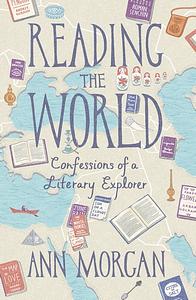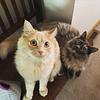You need to sign in or sign up before continuing.
Take a photo of a barcode or cover
I came to this book having been familiar with the blog which inspired it. I will be honest and say that I was expecting a different book entirely, one that might talk about the books in more detail. Instead this was a more analytical look at world literature and the future of the printed word in a modern globalisation world. Very interesting, but not what I was looking for. My mistake.
A strange reading experience. Reading the synopsis after the book, I don't feel bad that I initially thought I would be reading a collection of non-fiction essays focused on the books that made up Morgan's year long reading project, that I now gather were covered in her blog. The synopsis supports that assumption. Instead, while a few of the books and their authors are discussed, this book is actually a take on issues encountered when considering reading world literature, primarily from a western, anglophone point of view. There are a number of interesting figures consulted and quoted on the issues, but it made me want to read their books more than this one. I kept having the feeling that maybe this was groundbreaking when it was published almost 10 years ago, but especially considering the discussions going on in the book world in the last few years, it doesn't just feel very familiar, in some cases, it feels a little dated and backward. A chapter on the idea of nationality and culture, how that can be quite fluid depending on the author's life experiences, opens with what seems to me a clear-cut case of appropriating a different ethnic and gender identity for profit. The chapter on censorship and propaganda might be lauded for the author's willingness to be honest about how the media regarded in her youth led her to think of North Koreans as lesser people, but the 'we' framing in the chapter, as if the reader must have shared her viewpoint really put me off. Maybe I'm naive, but the translation chapter, which for some reason needs to start with interpreters in the US led invasion of Iraq, segueing into the ways that translators are dismissed or reviled shocked me, in comparison to how I see their contributions appreciated and acknowledged in the book community I take part in today. I can't tell if I wish this book had been published today, with the inevitable upgrades that would represent in the discussions, or if it would be a different book if it was published today. No doubt there are still conversations that need to be had around the idea of diversity in publishing, in reading, but I don't feel like I gained anything new in that discussion from reading this book. ⚠️mention of suicide, SA, conflict-related violence, racism, homophobia
I came to this book having been familiar with the blog which inspired it. I will be honest and say that I was expecting a different book entirely, one that might talk about the books in more detail. Instead this was a more analytical look at world literature and the future of the printed word in a modern globalisation world. Very interesting, but not what I was looking for. My mistake.
Fascinating. It took me forever to read it because at times it became very academic which is challenging for me or can be a little boring or at least tiresome. But overall it presented all sorts of thoughtful ideas about world literature, cultures, how technology affects reading, cultural literacy, translation, and how we interact with one another. Lots to ponder. Lots more to discuss. Worth reading, at least a few of the chapters.
challenging
informative
inspiring
medium-paced
informative
reflective
slow-paced
Y'all are going to get really tired of me talking about this book between now and May, when it comes out in the US.
A very well-written examination of why the Anglophone (specifically UK, and US by extension) reading population and publishing arm reads little world literature, particularly in translation, and the roadblocks one encounters when trying to find and read literature (and, by extension, purchase legally) by authors from, say, Burkina Faso or Nepal or Kuwait or Monaco or Lichtenstein. A huge list of books to read can be derived from Ann's work both in the actual 197 books she read in 2012 and the books she references in mulling over her experience.
Recommendation: buy this sucker when it's available in May and read the heck out of it, pen in hand (or buy and read it now if you're in the UK where it's been out since January).
Full disclosure: I read Ann's blog and loved it so when I saw that Norton's Liveright imprint was going to put out the US edition of A Year of Reading the World I hot-footed (hot-typed?) my way to their Twitter account to beg a galley. Which they merrily sent out to me because galleys had just become available. So many thanks to Liveright for the galley
A very well-written examination of why the Anglophone (specifically UK, and US by extension) reading population and publishing arm reads little world literature, particularly in translation, and the roadblocks one encounters when trying to find and read literature (and, by extension, purchase legally) by authors from, say, Burkina Faso or Nepal or Kuwait or Monaco or Lichtenstein. A huge list of books to read can be derived from Ann's work both in the actual 197 books she read in 2012 and the books she references in mulling over her experience.
Recommendation: buy this sucker when it's available in May and read the heck out of it, pen in hand (or buy and read it now if you're in the UK where it's been out since January).
Full disclosure: I read Ann's blog and loved it so when I saw that Norton's Liveright imprint was going to put out the US edition of A Year of Reading the World I hot-footed (hot-typed?) my way to their Twitter account to beg a galley. Which they merrily sent out to me because galleys had just become available. So many thanks to Liveright for the galley
Brilliant book. Took me way too much time to read because the subject matter is heavy and the author’s style of long sentences means I had to read some paragraphs more than once. But I am very glad to not have given up on this book.
The list of books the author read in that year is listed at the end of the book and am definitely going to use that for my reading list.
The list of books the author read in that year is listed at the end of the book and am definitely going to use that for my reading list.
First: I loved this book, the more I read the more I liked it and would have happily read 8 more chapters.
As you see from many other reviewers, the book wasn't what they expected, and the same was true for me. I knew it was not a reviews of each of the books, I kind of expected it to be a story about the project and how it was executed and some interesting stories along the way. At first I too was disappointed that it took a different tack. However, I soon realised that as with any project where you dive into the unknown, unexpected things happen. You question your thinking, you find yourself adjusting and reevaluating your plans. You learn, and the experience takes you down many paths. I loved it that Ann Morgan shared more than the experience of the books themselves (some are mentioned, and have been added to my "want to read" list), and even the strategy of how you decide a book is "from a country". I enjoyed the additional thoughts (which I expect came even beyond the 12 months) on the challenges of translation, of getting published, the imbalance in exposure of anglophone novels, the challenges of censorship. I enjoyed the realisation that it's not enough to read a translated book, context is king, and I as an anglophone may not understand the context of a novel from a vastly different part of the world. Like I said, I started of a little disappointed, but really relished reading this book the further I got into it. Bravo Ann!
As you see from many other reviewers, the book wasn't what they expected, and the same was true for me. I knew it was not a reviews of each of the books, I kind of expected it to be a story about the project and how it was executed and some interesting stories along the way. At first I too was disappointed that it took a different tack. However, I soon realised that as with any project where you dive into the unknown, unexpected things happen. You question your thinking, you find yourself adjusting and reevaluating your plans. You learn, and the experience takes you down many paths. I loved it that Ann Morgan shared more than the experience of the books themselves (some are mentioned, and have been added to my "want to read" list), and even the strategy of how you decide a book is "from a country". I enjoyed the additional thoughts (which I expect came even beyond the 12 months) on the challenges of translation, of getting published, the imbalance in exposure of anglophone novels, the challenges of censorship. I enjoyed the realisation that it's not enough to read a translated book, context is king, and I as an anglophone may not understand the context of a novel from a vastly different part of the world. Like I said, I started of a little disappointed, but really relished reading this book the further I got into it. Bravo Ann!
informative
slow-paced
While I like Ann's project of reading a book from every country in the world, and was very happy to read about the limits and difficulties she encountered when setting out the lines of it. It helped us in our 'reading around the world' bookclub to be more mindful. However, this book was a bit repetitive and got boring really quickly for me. Would not necessarily recommend unless you are invested in this type of project.






